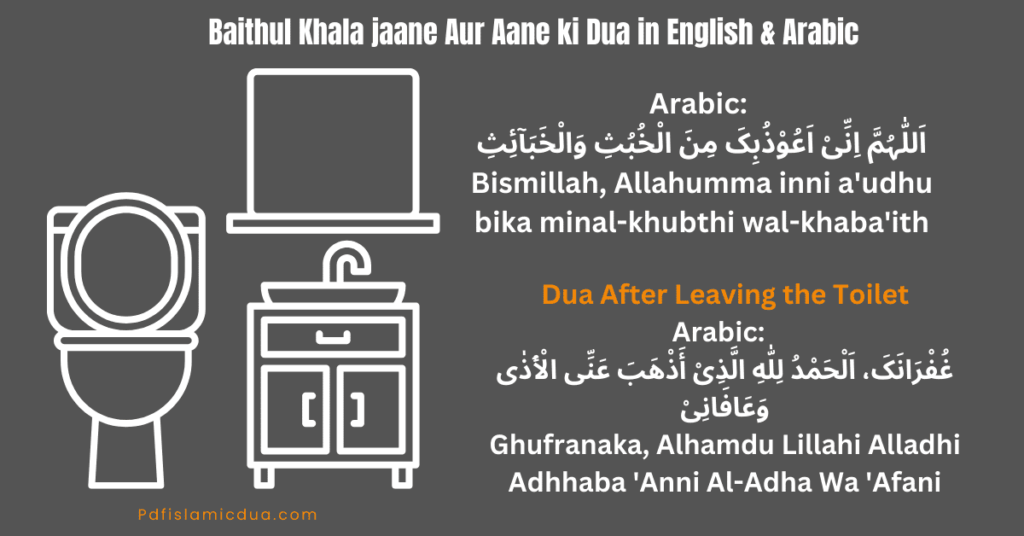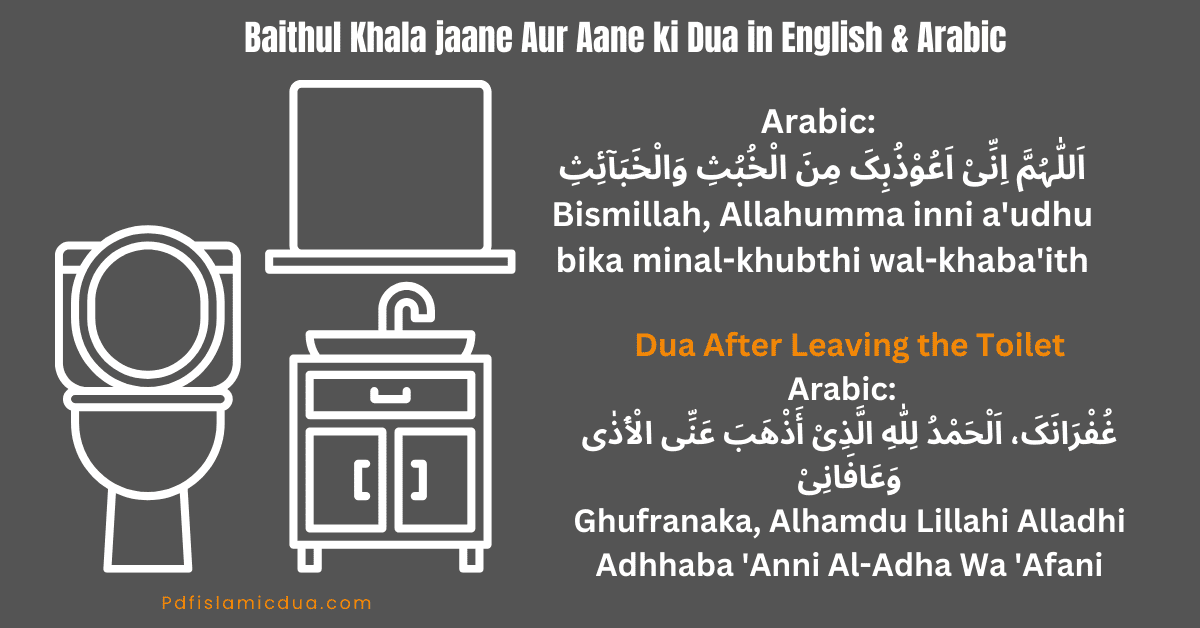Blog
Dua & Surah PDF
baitul khala, baitul khala jaane ki dua, baitul khala jane ki dua, baitul khala jane ki dua in english, baitul khala ki dua, baitul khala me dakhil hone ki dua, baitul khala mein dakhil hone ki dua, baitul khala mein jaane ki dua, baitul khala mein jane ki dua, baitul khala se bahar aane ki dua, baitul khala se bahar nikalne ki dua, baitul khala se nikalne ki dua, baitul khala se nikalne ki dua in english, toilet me jane ki dua in english
pdfislamicdua
0 Comments
Baithul Khala jaane Aur Aane ki Dua in English & Arabic
Islam offers us Masnoon Duas for various daily activities, including the important moments of entering and exiting the toilet. These duas, such as the Baithul Khala Jaane Aur Aane ki Dua in English & Arabic, are simple yet meaningful, helping us stay connected with Allah’s blessings and seek His protection throughout our day.

Baithul Khala jaane Aur Aane ki Dua in English & Arabic
Dua Before Entering the Toilet
Arabic:
اَللّٰہُمَّ اِنِّیْ اَعُوْذُبِکَ مِنَ الْخُبُثِ وَالْخَبَآئِثِ
Bismillah, Allahumma inni a’udhu bika minal-khubthi wal-khaba’ith
“O Allah, I seek Your protection from impure Jinn (male and female).”
Source: Al-Bukhari 1:45, Muslim 1:283
Derivation
Narrated by Anas bin Malik:
“Whenever the Messenger of Allah entered the toilet, he would say: ‘A’udhu Billahi minal-khubthi wa’l-khaba’ith (I seek refuge with Allah from male and female devils).'”
Source: Sunan Ibn Majah 298
Dua After Leaving the Toilet
Arabic:
غُفْرَانَکَ، اَلْحَمْدُ لِلّٰهِ الَّذِیْ أَذْهَبَ عَنِّی الْأَذٰی وَعَافَانِیْ
Ghufranaka, Alhamdu Lillahi Alladhi Adhhaba ‘Anni Al-Adha Wa ‘Afani
“I ask You (Allah) for forgiveness. All praise is due to Allah, who removed discomfort from me and granted me relief.”
Source: Sunan Ibn Majah 301
Derivation
Narrated by Anas bin Malik:
“Whenever the Prophet exited the toilet, he would say: ‘Al-hamdu lillahilladhi adhhaba ‘annial-adha wa ‘afani (Praise is to Allah Who has relieved me of impurity and given me good health).‘”
Source: Sunan Ibn Majah 301
Benefits of Reciting Baithul Khala jaane Aur Aane ki Dua
- Seeking Protection: The dua before entering the toilet seeks Allah’s protection from impure Jinn, safeguarding us spiritually.
- Conscious Devotion: These duas help us incorporate faith into even simple, daily actions, reflecting mindfulness and devotion to Allah.
- Spiritual Reward: While not mandatory, reciting these duas brings spiritual rewards and follows the Sunnah of the Prophet Muhammad (ﷺ).
- Blessings and Protection: These duas ensure that we invite Allah’s blessings and protection into our daily lives.
Frequently Asked Questions
Should You Close the Bathroom Door in Islam?
There is no specific Islamic requirement to close the bathroom door. The only instruction is to close house doors at night, as stated in Sahih Bukhari (3304). The Prophet (ﷺ) said, “When night falls, keep your children close, for the devils spread out at that time. Close the doors and mention the Name of Allah, for Satan cannot open a closed door.”
While Jinn may prefer dirty places like bathrooms, and a dua is prescribed for entering the toilet, closing the bathroom door is not specifically required.
However, reciting the Qur’an is a key practice for protecting your home from Jinn. The Prophet (ﷺ) said, “Satan runs away from a house in which Surah Al-Baqarah is recited” (Muslim 780).
Is My Wudu Broken If I Enter the Bathroom?
Simply entering the bathroom does not break your wudu unless there is a release of gas, urine, or feces.
Can We Hang Clothes in the Washroom in Islam?
Firstly:
The bathrooms in which people relieve themselves are abodes of the devils, so no one should stay in them except as long as he needs to.
Abu Dawood (6) narrated from Zayd ibn Arqam, that the Messenger of Allah (blessings and peace of Allah be upon him) said: “These places where you relieve yourselves are inhabited (by the devils), so if one of you goes to the place in which he relieves himself, let him say ‘A‘oodhu Billahi min al-khubthi wa’l-khabaa’ith (I seek refuge with Allah from the male and female devils).’”
(Classed as saheeh by al-Albaani in Saheeh Abi Dawood)
In the above paragraph, the word translated as inhabited means that the jinn and devils frequent these places, lying in wait for the sons of Adam, to harm them and cause mischief, because they are places where ‘awrahs are uncovered and the name of Allah is not mentioned.
See: Mirqaat al-Mafaateeh (1/386).
An-Nawawi (may Allah have mercy on him) said:
It is mustahabb to avoid places frequented by the Shaytaan. This is the more correct of the two reasons mentioned for the prohibition on praying in bathrooms.
End quote from Sharh an-Nawawi ‘ala Muslim (5/183).
Secondly:
Hanging up clothes in bathrooms has nothing to do with that, so it is not makrooh to hang up clothes in bathrooms, for the reason mentioned above. As for the devils lying in wait to cause harm, that has nothing at all to do with clothes and hanging them up. Rather it is a false claim and a myth like those that become widespread among people.
And Allah knows best.
(Answer derived from islamqa.info)














Post Comment